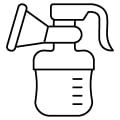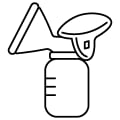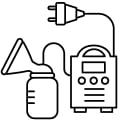Breastfeeding: Choosing a Breast Pump
Overview
A breast pump is a device that allows you to empty milk from your breasts whenever you want to or need to. Then you can store the milk for later.
You can also express breast milk by hand (manual expression). But it takes longer to completely empty a breast this way. Pumps work faster and can be operated by hand, with batteries, or with electricity.
If you plan to use a breast pump, you may want to research the different types of pumps while you're pregnant. Think about:
- How often you will need to use the pump.
- How long you plan to breastfeed.
- How easy the pump is to use. Some pumps may be heavier than others.
- If the pump will meet your needs. Some electric models pump both breasts at once (double electric pumps).
Whichever pump you choose, be sure to follow the manufacturer's instructions on how to use the pump safely and how to clean the pump parts. Always wash your hands before pumping and before handling milk that will be stored.
What types of breast pumps can you use?
There are different types of breast pumps to choose from.

Manual pumps:
- Don't require a power supply since they're pumped by hand.
- Are easy to carry with you.
- May cost less than other types of pumps.
- Are slower than electric or battery-powered pumps.

Battery-powered pumps:
- Use a battery-powered motor to create suction and remove milk. In most pumps, the battery can be recharged.
- Are convenient when you don't have an outlet handy.

Electric pumps:
- Use an electric motor to create suction and remove milk.
- Are often faster and more comfortable than manual pumps.
- May work like the action of a breastfeeding infant.
- Are larger and heavier than manual pumps. But some newer models are lightweight.
Related Information
Credits
Current as of: April 30, 2024
Author: Ignite Healthwise, LLC Staff
Clinical Review Board
All Healthwise education is reviewed by a team that includes physicians, nurses, advanced practitioners, registered dieticians, and other healthcare professionals.
Current as of: April 30, 2024
Author: Ignite Healthwise, LLC Staff
Clinical Review Board
All Healthwise education is reviewed by a team that includes physicians, nurses, advanced practitioners, registered dieticians, and other healthcare professionals.


